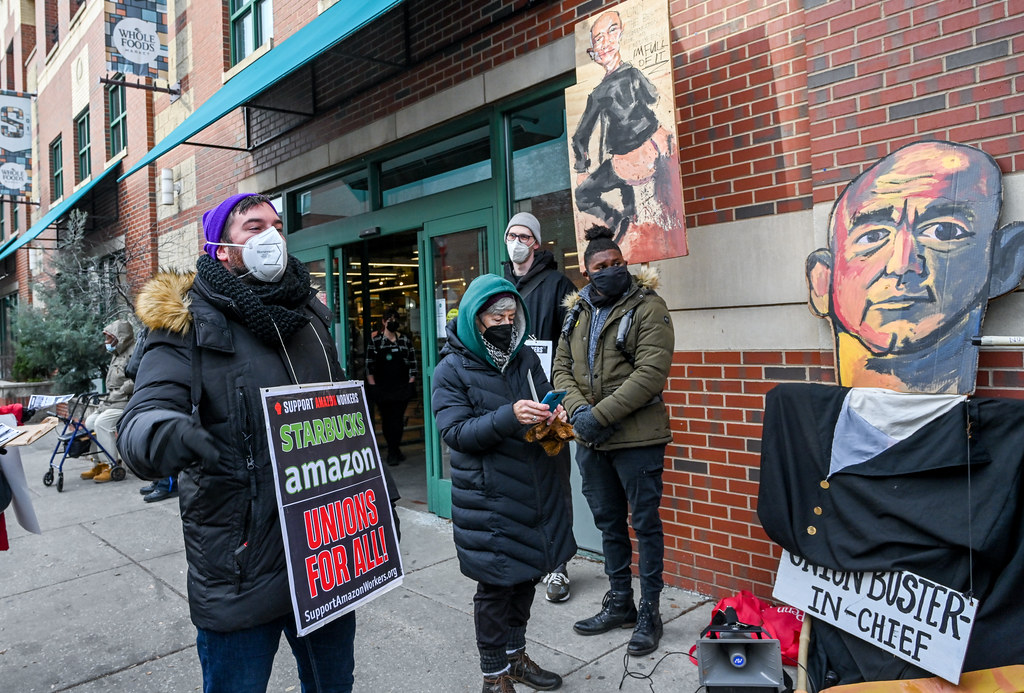
Tascha Shahriari-Parsa is a student at Harvard Law School.
In today’s news and commentary: the NLRB orders Amazon to recognize and bargain with ALU; the California Supreme Court is ruling on the compensation of inmates awaiting trial; the EEOC signals focus on discrimination by AI in hiring decisions; striking nurses at Mount Sinai reach agreement.
Amazon has been ordered by the NLRB to recognize and bargain with the Amazon Labor Union (ALU) at the company’s “JFK8” warehouse in Staten Island, New York. The ALU won an April 2021 election in the warehouse to form the first U.S. bargaining unit at the company. Amazon filed several challenges to the election, but a hearing officer recommended rejecting all of them in a September ruling, which the NLRB regional office has now adopted. The NLRB ruling imposes a legal duty on Amazon to recognize the ALU as the workers’ representative at the warehouse and negotiate a contract. If Amazon refuses to bargain, the union may file a charge with the NLRB to force the company to the table.
The California Supreme Court is being asked to rule on the compensation of inmates awaiting trial. The inmates, who have been working in Alameda County jails for a subsidiary of Aramark Corp, have not been convicted and are currently awaiting trial. The case arises from a challenge to a federal district judge ruling in 2021 that refused to dismiss a class action lawsuit brought by the inmates under California state wage laws, concluding that the detainees could bring claims for unpaid wages under the California Labor code. The decision in this case could impact the unpaid or underpaid labor that is commonplace in the U.S. correctional system.
The US Equal Employment Opportunity Commission (EEOC) has stated that it will focus on the risk of discriminatory decision-making being introduced by artificial intelligence (AI) tools used in hiring. The EEOC’s draft Strategic Enforcement Plan, which was published in the Federal Register, includes updates that, for the first time, take into account “employers’ increasing use of automated systems, including artificial intelligence or machine learning,” to make hiring and recruiting decisions. The Plan indicates that the EEOC will apply federal non-discrimination laws in the same way, whether the discrimination occurs through traditional recruitment methods or through the use of automated tools. The EEOC will host a public hearing on the use of AI tools in employment decisions. The Plan also seeks to expand the agency’s focus on vulnerable workers, including workers with intellectual or developmental disabilities and those with limited English proficiency.
Nurses at Mount Sinai Medical Center and Montefiore Medical Center in New York City have returned to work after ending a three-day strike and reaching a new contract that guarantees higher staffing levels and wages. Over 7,000 nurses went on strike after their contracts expired at the end of December. “We’re treated like step-kids,” said Linda Sobers, a nurse whoh has worked at Mount Sinai for the last 23 years. “We’ve been swept in the corner, and no one’s listening to us.” In response, the hospitals took measures including the reduction of care and cancellation of some elective procedures. After mounting public pressure, the nurses union and the hospitals reached a tentative agreement on the third day of the strike. As part of the new labor agreement, new staffing ratios will go into effect with financial penalties for hospitals that fail to comply.






Daily News & Commentary
Start your day with our roundup of the latest labor developments. See all
April 22
DOL and EEOC beat the buzzer; Striking journalists get big NLRB news
April 21
Historic unionization at Volkswagen's Chattanooga plant; DOL cracks down on child labor; NY passes tax credit for journalists' salaries.
April 19
Alabama and Louisiana advance anti-worker legislation; Mercedes workers in Alabama set election date; VW Chattanooga election concludes today.
April 18
Disneyland performers file petition for unionization and union elections begin at Volkswagen plant in Tennessee.
April 18
In today’s Tech@Work, a regulation-of-algorithms-in-hiring blitz: Mass. AG issues advisory clarifying how state laws apply to AI decisionmaking tools; and British union TUC launches campaign for new law to regulate the use of AI at work.
April 17
Southern governors oppose UAW organizing in their states; Florida bans local heat protections for workers; Google employees occupy company offices to protest contracts with the Israeli government